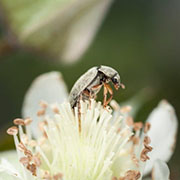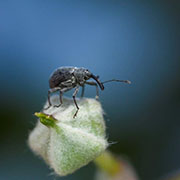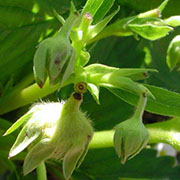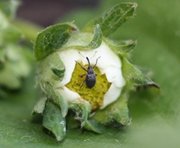Softpest Multitrap



More about the project
Results and conclusions
The project Softpest Multitrap has been aiming to develop knowledge about how to manage key pest insects in organic strawberry and raspberry. We have been focusing on the use of semiochemical based non-pesticidal management techniques for strawberry blossom weevil (SBW), the European tarnished plant bug (ETB) and raspberry beetle (RB). The results show that it is possible to reduce insect damage in the crops by using these techniques although some obstacles still exists to get a satisfying effective management of these pest insects.
In more details, Softpest Multitrap conclude the following:
- By chemical analyses, it has been developed new knowledge about volatiles emitted by host plants of the targeting these pest insect species. Several compounds have be identified.
- In laboratory bioassays it has been shown that some of these volatiles have behaviour modifying impact on the SBW. These volatiles may work as either attractants or repellents.
- The magnitude of SBW and ETB populations in the strawberry fields varies according to the seasons and location/latitude.
- Perimeter traps may reduce the migration of pest insects into a strawberry field. However, these traps will not affect individuals overwintering in the field and their offspring’s.
- It is possible to attract both SBW and ETB to the same trap in strawberry fields by using plant volatiles and their pheromones.
- The development of SBW populations in raspberry field seems to be different according to latitude and habitat.
- There seems to be a correlation between the RB population magnitude and the raspberry phenological development and environmental variables.
- Optimal traps for capturing pest insects in strawberry differ from optimal traps in raspberry.
- The traps design used for capturing ETB seems not to be satisfying effective.
- Using traps baited with plant volatiles and pheromones targeting specific pest insects seems not to have special impact on other insect species.
- Mass trapping pest insects in both strawberry and strawberry by using traps baited with plant volatiles and insect pheromones reduce damage and provide more marketable fruits.
Softpest Multitrap
 8 partners, 6 countries 8 partners, 6 countries Coordinator Coordinator: Research Director PhD Atle Wibe, Bioforsk - Organic Food and Farming Division, Norway Partners PhD, Prof. Jerry Cross, East Malling Research, United Kingdom PhD, Prof. Anna-Karin Borg-Karlson, Kungliga Tekniska Högskolan, Sweden PhD, Prof. David R. Hall, University of Greenwich, United Kingdom PhD, Researcher Nina Trandem, Bioforsk, Norway PhD, Assoc. Prof. Lene Sigsgaard, University of Copenhagen, Denmark M.Sc, Head of group Catherine Baroffio, Agroscope Changins-Wädenswil, Switzerland Dr., Head of Group Ilze Apenite, Latvian Plant Protection Research Centre, Latvia |
Project stakeholders
The work will primarily target organic soft fruit growers in all countries in Europe i.e. throughout central and northern Europe. However, non-organic grower are often criticised for their extensive use of pesticides in soft fruit production.
Effective means for managing pest insects without use of insecticides are not available thus non-organic growers will also be interested in the outcome of this project.
